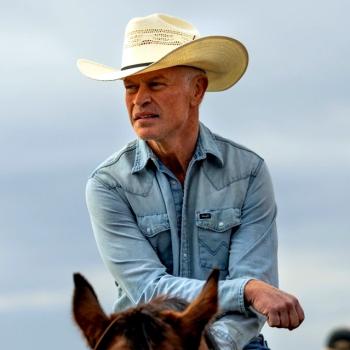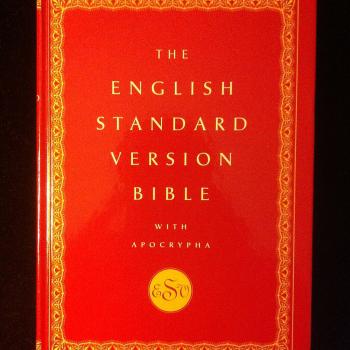Editors' Note: This article is part of the Public Square 2014 Summer Series: Conversations on Religious Trends. Read other perspectives from the Progressive Christian community here.
If a man is convinced that he is safe only as long as he uses his power to give others a sense of insecurity, then the measure of their security is in his hands. If security or insecurity is at the mercy of a single individual or group, then control of behavior becomes routine. All imperialism functions in this way. (Howard Thurman, Jesus and the Disinherited, p. 75)
The indomitable, late Howard Thurman was an influential African American author, philosopher, theologian, educator, and civil rights leader. He was Dean of Chapel at Howard University and Boston University for more than two decades and wrote twenty-one books. In 1944 he provided principal leadership and was the first pastor of the Church for the Fellowship of All Peoples in San Francisco, California.
The Church, of which the pacifist organization Fellowship of Reconciliation was the principal sponsor, was the first intentionally multi-racial church in American history. For Thurman, preaching was more than just a by-product to building a successful congregation, but an opportunity to reconcile humanity unto itself. Thurman was able to challenge the traditional North American orthodoxy of Scripture by embodying it in his pastoral praxis. Indeed, he was being the change he wished to see in the world.
Do me a favor. Quickly go back and read the quote from Thurman atop the page. Did you do it? Now read it again. Reflect on it. Now take time to consider the state of our planet in 1944. Militarism and fascism were the rule of the day as a consequence of World War II. Racial, economic, and political upheaval were embedded in every meaningful conversation in every country. Sociologists and historians were openly questioning the world's ability to wade through this seemingly impenetrable malaise or "funk." Yet, a black preacher from Daytona Beach, Florida who had the courage to pastor the world from a local context had the unmitigated gall to say:
Why is it that Christianity seems impotent to deal radically, and therefore effectively, with the issues of discrimination and injustice on the basis of race, religion, and national origin? Is this impotency due to a betrayal of the genius of the religion, or is it due to a basic weakness in the religion itself? (Jesus and the Disinherited, Preface)
These (as well as the quote to start this essay) are the words from Thurman's seminal work entitled Jesus and The Disinherited, a classic that grew out of a series of lectures Thurman gave to the leadership of the YMCA and a conversation he had on his initial trip to India in the early 1940s. Thurman was provoked by indigenous Indian leadership who thought him a traitor to his race for being Christian. It is widely known that Martin Luther King, Jr. always had the book with him in prison (alongside his Bible and William Styron's The Confessions Of Nat Turner). The premise of this classic was simple: the religion of Jesus must always speak consistently to those persons who live with "their backs against wall."
In other words, the Bible must go to hell.
Jesus was a Jew. Jesus was a poor Jew. Jesus was poor Jew minority in a Roman-dominated culture. This was not liberation theology for Thurman. These were the facts. Thurman offered these historical facts to flesh out the idea that Jesus could identify with those on the margins because he lived his life on the margin himself. For Jesus the fulfillment of God's reign on earth was neither a display of charity nor was it an act of justice. It was his life.
Jesus knew what it was like to be born in difficult circumstances (Luke 2:7). Jesus knew what it felt like to have your place of origin publicly ridiculed (John 1:46). He had experienced real pangs of both hunger and homelessness (Matthew 8:20). He was even murdered for a crime he didn't commit (Mark 15:37). Jesus' empathy with the disinherited was far from an existential exercise. He had quite literally been through hell and back. As the sun begins to set on the presidency of Barack Hussein Obama, there is a serious question before a burgeoning progressive Christianity that is both gaining notoriety and traction. Will we simply speak on behalf of the disinherited or are we willing to incarnate the Gospel in ways that unleash the shackles the vast majority of the world finds themselves in?
Are you willing to go to hell?
What is the role of Scripture for progressives? How do we define its authority? To what extent is it prescriptive for 21st-century Christians? Such questions are luxuries that the majority of those who live in hellish conditions do not have the luxury to ponder. Context. Content. Consciousness. We who have time to give it serious weight must always do so with those whose backs are against the wall at the forefront of our conscience. We must summon up the moral courage to pray with our eyes open and feet moving. This will require all of us entrusted with the special privilege to serve publicly to live a disciplined life of which the spiritual practices of old become as real to us as breathing. Supplication. Study. Service. Such things assist us in ensuring that our cultural baggage doesn't impede upon the holistic revolution that people are clamoring for, but first we must be willing to both exegetically and literally go to hell. A hell that is for many of us just as harrowing an internal experience as it is a daunting lived reality.
It is only when people live in an environment in which they are not required to exert supreme effort into just keeping alive that they seem to be able to select ends besides those of mere physical survival (Jesus and the Disinherited, p. 69).
6/18/2014 4:00:00 AM




